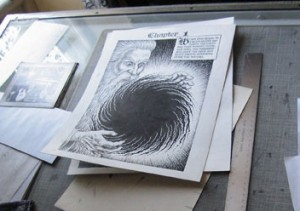
In the beginning of Paradise Lost, Milton paints and points and dallies, filling eight lines with sorrow and hope and mountains and fruit, disobeying the strictures of English grammar in favor of the more contorted Latinate, including, even, an “or” in line seven that threatens to undermine his progress, such as it is, until, in the beginning of line nine, he finally delivers the phrase “In the beginning”—the first words of Genesis—and then the sentence continues for several more lines, such that “In the beginning” serves as a sort of hinge, swinging the reader backward into the book’s preliminary lines or forward, if he will, into what follows, itself functioning as a sort of “or,” an opener of possibilities, a poser of questions.
It’s not over yet.
As if in tardy celebration of Milton’s 400th birthday (which, you’ll remember from all the parties, was last year), scholars and graphic novelists and rightist revisionists have been reworking the Bible. Certain conservatives are seeking to reform and void the King James version, which they view as troublingly liberal, while a Dutch scholar investigates Genesis’s first verb. R. Crumb’s Genesis is forthcoming, as is David Rosenberg’s Literary Bible. You're doubtless wondering, as I am: will any of these make the Good Book an even Better Book?
Let's begin with the conservative translation project, guided by ten commandments of sorts. One warns against “emasculation,” urging translators to avoid “unisex, ‘gender inclusive’ language.” Socialist incursions into Biblical text present problems, too (in one edition of the Bible, they write, “the socialistic word ‘comrade’ is used three times”). The authors of the Wikipedia-style page detailing this undertaking anticipate some discomfort with their ideas: “liberals will oppose this effort, but they will have to read the Bible to criticize this, and that will open their minds,” they write.
In analyzing this project, where does one begin?
The first word of the first sentence of the first book of the Bible, naturally.
With Milton's opening in mind, I decided to compare and contrast their version of Genesis 1:1 with the King James translation. The latter reads, “In the beginning God created heaven and the earth.” This makes sense; the first word of Genesis is “B’reisheet,” meaning “In the beginning.” The “Proposed Conservative Translation,” by contrast, reads: “God created heaven and earth in the beginning.” The site provides the following “analysis” as explanation: “The first word is God.”
All right. But it isn’t. Also, the explanation itself rings of the King James translation of the Gospel According to John ("In the beginning was the Word, and the Word was with God, and the Word was God"). If only they could offer a Miltonic defense for the revision--something about Classical syntax, perhaps.
Moving on to the second word of Genesis. Over in the Low Countries, academic Ellen van Wolde is scrutinizing the Hebrew verb “bara." She argues that it means not “created,” as traditionally understood, but “separated.”
According to The Telegraph, she based this conclusion on the observation that God always “created” in plurals: "God was the subject (God created), followed by two or more objects. Why did God not create just one thing or animal, but always more?" Genesis according to van Wolde, then, begins: “In the beginning, God separated heaven and earth.” The idea that heaven and earth predated humans appears in other ancient texts, she writes.
But let’s not dither. The third word of Genesis is Elohim, or God, whose details, physical and otherwise, have provided fodder for R. Crumb. While crafting his recent comic book Genesis, which hews closely to the King James text, he told Time:
He has a white beard but he actually ended up looking more like my father. He has a very masculine face like my father. My problem was, how am I going to draw God? Should I just draw him as a light in the sky that has dialogue balloons coming out from it? Then I had this dream. God came to me in this dream, only for a split second, but I saw very clearly what he looked like. And I thought, ok, there it is, I’ve got God.
(See picture at top.)
If this is getting to be too much, why not eschew that troubling sentence altogether? In his forthcoming tome A Literary Bible, David Rosenberg treats the Bible as a literary work rich with fissures and mysteries. Rather than insist on tidiness, as the conservative translators appear to, he delights in the work's innate messiness. He writes:
The Bible is a deeply complex text, and its primitive passages are set in a sophisticated writer’s looking back, so it’s the wrong material for literal-minded comedians and artists, who are prone to react before they think. My translations, whether they render the Bible as strange or strangely familiar, engage the ancient texts in contemporary terms. I do not seek to embellish or alter the originals, but mainly to restore the original experience of reading them.
That original chaos, he suggests, is most generative.
Abigail Deutsch, the winner of Poetry magazine's 2010 Editors Prize for Reviewing, lives in New York...
Read Full Biography

